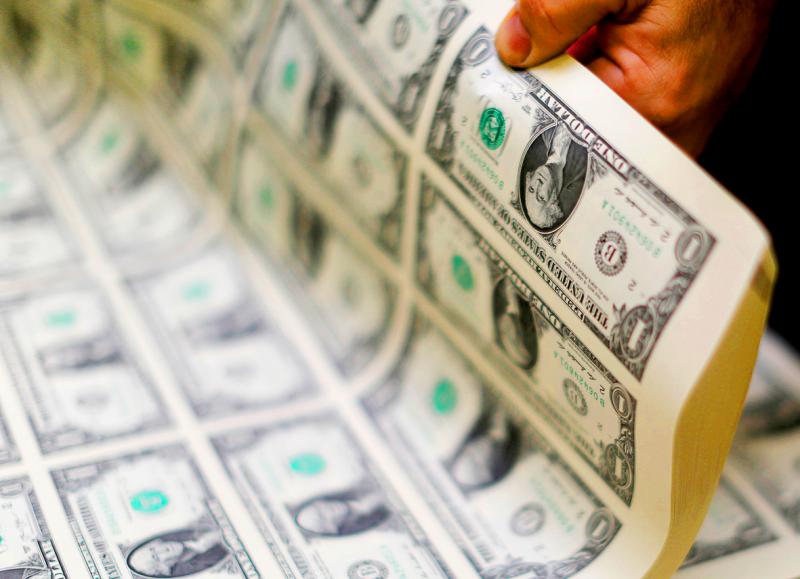The US dollar on Friday sank to its lowest level in more than two months against a basket of currencies, as vote counting for the contentious US elections slowly moved toward a divided government and investors predicted more losses for the currency.
Investors are betting that former US vice president Joe Biden is to become the next president but Republicans are to retain control of the US Senate, which would make it difficult for the Democrats to pass the larger COVID-19 relief package they have been pushing.
The need for more stimulus was underlined on Friday, when the US government reported that employers hired the fewest workers in five months in October.

Photo: Reuters
It was the clearest evidence yet that the end of the previous fiscal stimulus and exploding new COVID-19 infections were sapping momentum from the economic recovery.
The surge of new coronavirus cases to record levels in several US states could also curb economic activity.
SELLING PRESSURE
“We’re still left with the view that the US economy is decelerating, and that’s playing out in a markedly weaker dollar,” said Joe Manimbo, senior market analyst at Western Union Business Solutions.
The US dollar index fell 0.31 percent against a basket of six major currencies to 92.235, hitting its lowest level since Sept. 2. For the week, the index was down 1.92 percent.
A large decline in long-term US Treasury yields due to expectations for less fiscal stimulus, combined with a rally in equities and other riskier assets, has placed the US dollar under consistent selling pressure that is likely to continue.
“So far investors have been prepared to overlook the threat of a contested election, presumably seeing [US President] Donald Trump’s legal initiatives as frivolous, and these benign conditions have generated a broad-based dollar decline,” strategists at ING Groep NV said.
EIGHT-MONTH LOW
The US dollar fell further against the Japanese yen, trading at ¥103.255, close to an eight-month low.
Japanese Prime Minister Yoshihide Suga has vowed to work closely with overseas authorities to keep currency moves stable, because a strong yen is widely viewed as a threat to Japan’s economy.
To be sure, the US dollar could strengthen if the US vote counting continues to stretch out.
“The longer the vote counting goes, the more nervous the market could get and that could actually result in safe-haven flows for the greenback, but for now, it looks like there’s the potential for dollar sentiment to continue to erode in the weeks ahead,” Manimbo said.
In Taipei on Friday, the New Taiwan dollar declined against the greenback, losing NT$0.002 to close at the day’s low of NT$28.876. However, it gained 0.17 percent from a week earlier.
The onshore yuan gained to 6.5868 yuan per US dollar, the strongest in more than two years.
Many investors expect a Biden administration would slightly scale back Trump’s trade war with China, which should benefit the yuan.
Against a buoyant euro, the US dollar traded at US$1.1882 after falling 0.87 percent in the previous session.
The single currency has risen sharply this week on the US dollar’s weakness, but has also benefited from news of the EU inching closer to a budget deal.
Additional reporting by CNA, with staff writer

Among the rows of vibrators, rubber torsos and leather harnesses at a Chinese sex toys exhibition in Shanghai this weekend, the beginnings of an artificial intelligence (AI)-driven shift in the industry quietly pulsed. China manufactures about 70 percent of the world’s sex toys, most of it the “hardware” on display at the fair — whether that be technicolor tentacled dildos or hyper-realistic personalized silicone dolls. Yet smart toys have been rising in popularity for some time. Many major European and US brands already offer tech-enhanced products that can enable long-distance love, monitor well-being and even bring people one step closer to

Malaysia’s leader yesterday announced plans to build a massive semiconductor design park, aiming to boost the Southeast Asian nation’s role in the global chip industry. A prominent player in the semiconductor industry for decades, Malaysia accounts for an estimated 13 percent of global back-end manufacturing, according to German tech giant Bosch. Now it wants to go beyond production and emerge as a chip design powerhouse too, Malaysian Prime Minister Anwar Ibrahim said. “I am pleased to announce the largest IC (integrated circuit) Design Park in Southeast Asia, that will house world-class anchor tenants and collaborate with global companies such as Arm [Holdings PLC],”

TRANSFORMATION: Taiwan is now home to the largest Google hardware research and development center outside of the US, thanks to the nation’s economic policies President Tsai Ing-wen (蔡英文) yesterday attended an event marking the opening of Google’s second hardware research and development (R&D) office in Taiwan, which was held at New Taipei City’s Banciao District (板橋). This signals Taiwan’s transformation into the world’s largest Google hardware research and development center outside of the US, validating the nation’s economic policy in the past eight years, she said. The “five plus two” innovative industries policy, “six core strategic industries” initiative and infrastructure projects have grown the national industry and established resilient supply chains that withstood the COVID-19 pandemic, Tsai said. Taiwan has improved investment conditions of the domestic economy

Sales in the retail, and food and beverage sectors last month continued to rise, increasing 0.7 percent and 13.6 percent respectively from a year earlier, setting record highs for the month of March, the Ministry of Economic Affairs said yesterday. Sales in the wholesale sector also grew last month by 4.6 annually, mainly due to the business opportunities for emerging applications related to artificial intelligence (AI) and high-performance computing technologies, the ministry said in a report. The ministry forecast that retail, and food and beverage sales this month would retain their growth momentum as the former would benefit from Tomb Sweeping Day